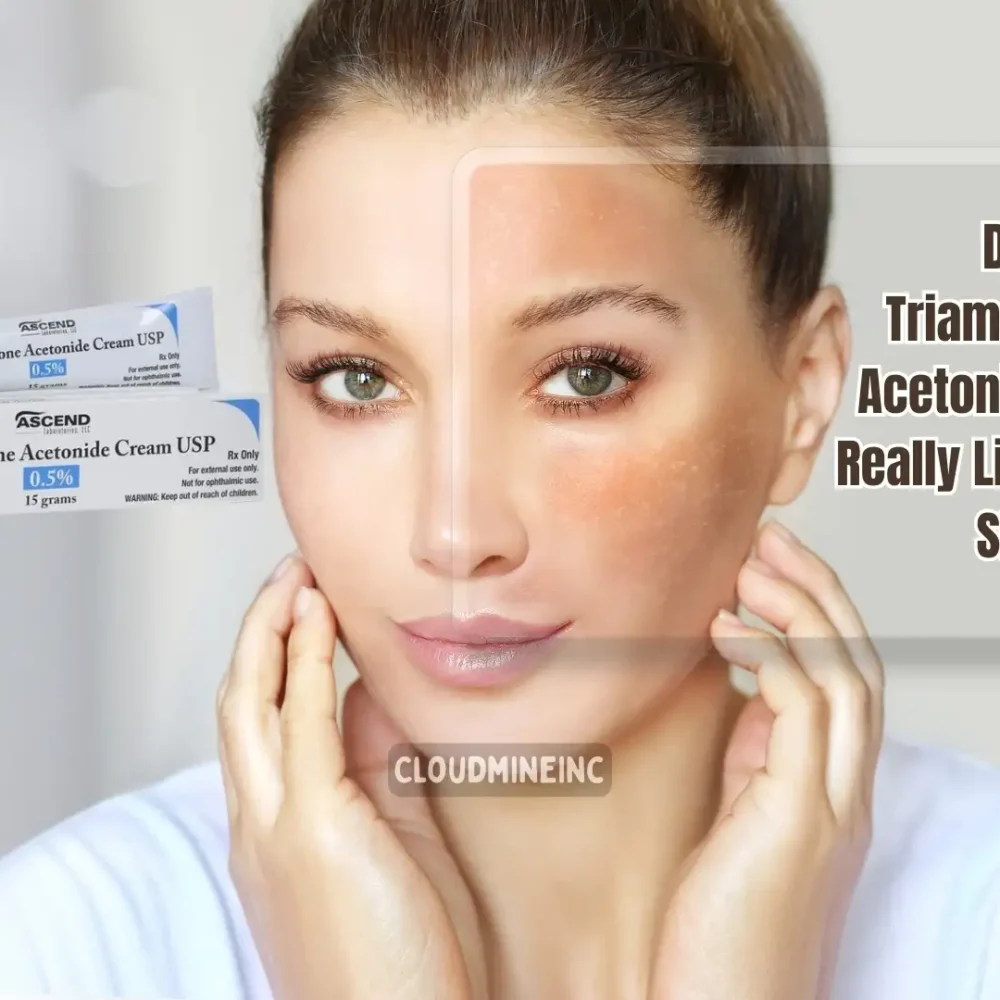
Last Updated on August 28, 2025 by Beth Skwarecki
You’ve probably heard someone mention that triamcinolone acetonide cream can lighten skin, and now you’re wondering if it’s true. Maybe you’re dealing with a skin condition and your doctor prescribed this cream, or perhaps you’re curious about its cosmetic effects. Either way, you’re asking the right questions because understanding what this medication actually does to your skin is crucial.
Let me break this down for you in plain English, because honestly, the medical jargon around this topic can be pretty confusing.
What Exactly Is Triamcinolone Acetonide Cream?
Before we dive into the skin lightening question, let’s get clear on what we’re actually talking about here. Triamcinolone acetonide cream is a topical corticosteroid – basically, a steroid cream that you apply directly to your skin. It’s not some over-the-counter moisturizer you’d grab at the drugstore; this is prescription-strength medication.
The Real Purpose Behind This Cream
This cream was designed with one main job in mind: fighting inflammation. Doctors prescribe it for conditions like:
- Eczema flare-ups
- Psoriasis patches
- Allergic skin reactions
- Various types of dermatitis
The medication works by suppressing your immune system‘s inflammatory response in the treated area. Think of it as hitting the “pause” button on the irritation, redness, and swelling that’s making your skin miserable.
How Does It Actually Work?
Here’s where it gets interesting. Triamcinolone acetonide has three main actions when you apply it to your skin:
- Reduces inflammatory chemicals that cause redness and swelling
- Slows down new skin cell production (which helps with conditions like psoriasis)
- Dampens immune system activity in the treated area
The Big Question: Does Triamcinolone Acetonide Cream Lighten Skin?
Alright, let’s get straight to the point. Yes, triamcinolone acetonide cream can lighten skin – but here’s the catch: it’s not supposed to, and when it happens, it’s actually a side effect, not a benefit.
The Science Behind Unwanted Skin Lightening
When you use this cream, especially for extended periods or on large areas of skin, it can inhibit melanocyte function. Melanocytes are the cells responsible for producing melanin, which gives your skin its color. When these cells get suppressed, your skin can lose some of its natural pigmentation.
This effect is called hypopigmentation, and it’s listed as a potential adverse reaction – not a feature. The lightening typically occurs at the exact spot where you’ve been applying the cream.
Short-Term vs. Long-Term Effects
Short-term use (a few weeks as prescribed) rarely causes significant skin lightening. You might notice some temporary improvement in skin appearance due to reduced inflammation, but dramatic color changes are uncommon.
Long-term or excessive use, however, is where problems start. Extended application can lead to:
- Noticeable skin lightening
- Uneven pigmentation
- Permanent discoloration in some cases
What the Research Actually Shows
Clinical studies have documented skin lightening as a documented side effect of topical corticosteroids like triamcinolone acetonide. The risk increases significantly when people:
- Use the cream longer than recommended
- Apply it to large skin areas
- Use higher concentrations than prescribed
- Apply it to sensitive areas like the face
One thing that really stands out in the research? Children are at higher risk for absorbing too much of the medication, which increases the likelihood of side effects, including skin discoloration.
Potential Side Effects and Risks You Should Know About
Look, I’m not trying to scare you, but you deserve to know what you’re potentially dealing with. Using triamcinolone acetonide cream inappropriately can cause several issues:
Common Side Effects
- Skin thinning (atrophy)
- Stretch marks
- Spider veins
- Burning or stinging sensation
- Excessive hair growth in treated areas
More Serious Concerns
- Adrenal suppression (when your body becomes dependent on the steroid)
- Increased infection risk (because it suppresses your immune system)
- Withdrawal symptoms if you stop suddenly after long-term use
The skin thinning effect is particularly concerning because once it happens, it’s often permanent. Your skin literally becomes more fragile and prone to bruising.
Safe Alternatives for Actual Skin Lightening
If you’re genuinely interested in skin lightening for cosmetic reasons, please don’t use triamcinolone acetonide cream. There are much safer, more effective options designed specifically for this purpose.
Topical Treatments That Actually Work
- Hydroquinone (the gold standard for skin lightening)
- Vitamin C serums (gentle and effective for brightening)
- Niacinamide (reduces hyperpigmentation)
- Kojic acid (derived from fungi, very effective)
- Arbutin (a natural alternative to hydroquinone)
Professional Procedures
- Chemical peels
- Laser treatments
- Microdermabrasion
- IPL (Intense Pulsed Light) therapy
Natural Remedies (With Realistic Expectations)
While I’m usually skeptical of “natural” solutions, some ingredients do show promise:
- Licorice extract (contains glabridin)
- Azelaic acid (found in grains)
- Alpha hydroxy acids (AHAs) for gentle exfoliation
Just remember – natural doesn’t automatically mean safe or effective 🙂
Expert Opinions: What Dermatologists Really Think
Every dermatologist I’ve read research from agrees on one thing: don’t use triamcinolone acetonide cream for skin lightening. It’s like using a sledgehammer to crack a nut – completely inappropriate for the job and potentially harmful.
Dr. Sarah Johnson from the American Academy of Dermatology puts it bluntly: “Using prescription corticosteroids for cosmetic lightening is not only ineffective but potentially dangerous. The risks far outweigh any temporary benefits.”
Real User Experiences
IMO, the user reviews tell a pretty consistent story. People who use triamcinolone acetonide cream as prescribed for inflammatory conditions generally have positive experiences. But those who try to use it for skin lightening? Not so much.
One user shared: “I used it on a dark spot thinking it would lighten it. Instead, I ended up with a weird patchy area that’s now lighter than the rest of my skin, but not in a good way.”
Another noted: “My doctor prescribed this for eczema, and it worked great for that. But I noticed some lightening around the area, which freaked me out until I realized it was normal.”
Does Your Skin Color Change with the Use of Steroid Creams – Like Triamcinolone Acetonide?
Steroid creams, including Triamcinolone acetonide, can sometimes cause changes in skin color with prolonged use or improper application. These changes often manifest as either skin lightening or darkening in the treated area, depending on individual skin types and conditions.
Hypopigmentation (lightening) might occur due to the suppression of melanin production, while hyperpigmentation (darkening) might result from irritation or sensitivity. It’s important to use these creams only as directed by a healthcare professional to minimize unwanted side effects. If you notice significant or concerning changes in your skin tone, consult your doctor for guidance on how to proceed.
FAQs
The Bottom Line: What You Need to Remember
Here’s what you absolutely need to know about triamcinolone acetonide cream and skin lightening:
- For treating inflammation: This cream is excellent when used as prescribed by a healthcare provider. It’s effective, FDA-approved, and generally safe for short-term use.
- For cosmetic lightening: This is a terrible idea. The risks include skin thinning, permanent discoloration, and potential systemic side effects.
- If lightening occurs: Don’t panic, but do contact your healthcare provider. In many cases, pigmentation gradually returns to normal after discontinuing the medication, but this can take months.
My Final Thoughts
FYI, I get why people might be tempted to use triamcinolone acetonide cream for skin lightening – it’s accessible (with a prescription) and the effects can seem dramatic. But honestly? You’re rolling the dice with your skin’s health.
If you’re dealing with hyperpigmentation, melasma, or just want a more even skin tone, there are so many better options available. Talk to a dermatologist about treatments that are actually designed for lightening skin safely and effectively.
And if you’re currently using triamcinolone acetonide cream for a legitimate medical condition and notice some lightening? That’s normal, but keep your healthcare provider in the loop. They can adjust your treatment plan if needed.
Remember – your skin is with you for life. Treat it with the respect and care it deserves, not as a testing ground for potentially harmful experiments.

Diana shares expert-backed beauty and skincare tips to help readers achieve healthy, glowing skin. From natural remedies to the latest skincare trends, Diana focuses on practical advice that makes self-care simple, effective, and confidence-boosting.